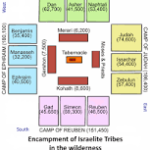Exhortation by Tim Colliver 8th January 2017.
Exhort – Our Relationship with God
Reading – Psalm 18
Introduction
Good Morning Brothers and Sisters,in the Lord Jesus Christ.
Today as brother Andrew has indicated, I’d like to look at our relationship with God, primarily because reading Psalm 18 is an inspirational example of this.
It also flows from a comment in last week’s exhort from Brother Peter, about getting to know our God, the Creator as we read those primary verses in Genesis, when the all-powerful God focuses His power on a drowned rock and creates for Himself a people capable of being loved and returning that love through knowledge and obedience. We are truly unique on this world, and importantly, each one of us is unique to the other.
We are different ages, genders, our lifestyles are diverse, and so our needs vary. And so as I read Psalm 18, I wondered about the words David uses to describe his God. And then I realised we’re in a very interesting place in our daily readings at the moment. We’re in the middle of some amazingly complex relationships with God. Moses is writing Genesis, Abraham is being called out, David is writing songs, and we’ve just left off with Job. Not to mention the birth of Jesus Christ.
All of these people worshipped the same God, let’s be clear about that much. But it is clear that their relationship to Him was as distinct as their circumstances, and we have a wonderful opportunity to examine those in light of our own, to be encouraged by their examples, to review our options in a way.
Take for example today’s reading, where David refers to God as his Rock, taking inspiration from Moses writing in Deuteronomy 32 as he subdues his enemies in God’s name.
Consider how that one word can encapsulate a relationship with God, Rock. And the hypothetical question this morning is, if you were to give God a name based on your relationship with Him, what would it be?
Middle
The words we use in our relationships are so insightful into the tone of that relationship. Imagine that I referred to Andrew as my Rock, it’s a strong word, you might be taken aback by it… shocked that you didn’t know how close we were. The next time you saw me upset you might check Andrew’s shoulder for tears. What about simply calling Andrew “Friend”, actually using the word in a sentence to others… that would mean a lot. Now think about this bunch of other words that we could use to describe our God.
Father (that’s an easy one), Confidante, Ally, Staff (a thing you might lean upon), Comforter.
What about some more less happy ones
Challenger, Inscrutable, Unpredictable, Unreliable.
Or worse
Unfaithful, Tempter, Tormentor, Adversary.
Now I can see by your faces that you recognise many of those words as wrong. But I don’t say them to shock (at least not entirely), I say them because they need to be held in the sunlight and seen as they are. Because it’s likely that in such a crowd as this, that at sometime, somebody, one of those Brothers or Sisters or Friends with us has felt that way, in the depth of circumstances they were struggling to understand, still believing in God, but the right name wasn’t available in their heart.
And so I think it helps us all, in this time aside we have to reflect on our lives, in this time away from home, work, trials and the world… to think about the words we have to choose from, and to find some words to aspire to in the week ahead. Something personal, that with focus can transform our relationship with God into what we want it to be, so it can be as strong as those who have gone before us.
Consider then first, Abraham
We’ve just read the beginning of Abraham’s story, the man who was called the Friend of God in James 2. Where God says to him in Genesis 12, Get up, I want you to leave everything you know, take your whole family with you and head off on a journey to some place you’ve never seen and I’ll give it to you and great blessings besides – and off he goes. The impact of that is nearly lost in so few words I know, but the Faith of Abraham is astounding. His trust in God is absolute, despite being an old man, he leaves behind comfort and heads for the desert. Despite being childless for years to come after God’s promise (which was repeated), his faith did not waver.
And when you look at the way he talks to God in Genesis 15 (2-3)… it’s inquisitive and trusting, ‘tell me the answer and I’ll believe you’ is the sense I get. Friends don’t lie to each other, they keep their promises. Even in the matter of Ishmael, or Sodom, where Abraham seems to negotiate, never does he attempt to force his point of view, but he is not afraid to ask, to be corrected, to learn and obey his Lord.
One oversimplification from Abraham’s life is the phrase “one thing leads to another”… that is, when Abraham trusts God, things turn out well. When Abraham forgets his friend and makes his own solution (Pharaoh / Abimelech), things go sour… but his friend still forgives. So we should remember to Trust. It seems Abraham’s relationship was bound up in the concept of a loving Lord, who provided for all his needs, who only needed to be asked, it’s a more personal meaning to the word than perhaps we assume given its consistent use throughout the Bible. And without making too strong a point, it’s likely a word related to the society Abraham came from, God was his new King, and King’s in those days were the ultimate authority and providers for their city states. So Abraham’s relationship word has meaning.
Next then, Moses
Of course the same basic Trust lesson applies… but Moses relationship to God was also unique, it was face-to-face (from Exodus 33:11), as a friend. But Moses, for all his meekness, has an unusual relationship with God, because right from the start, he pushes back. Exodus 3 and 4 show us a number of places where Moses tries to change God’s command, vs. 11 “not me, I wouldn’t send me if I was you”. Vs. 13 “if I go, I don’t even know your name, they’ll mock me”. 4vs10, “I’m not very good at speaking, too slow, you’ve made a bad choice in me God”, vs. 13 “please send someone else to do your work” – in vs. 12 Moses gets a stern response “I am God the creator, I made you and everyone else… I will be with you to strengthen you and overcome your deficiencies, now go!”
We know that Moses does go, but when things don’t go swimmingly first time, look at Moses words in Exodus 5v22, “what have you done Lord, why did you make me say those things, you haven’t delivered your people”. Now if those are the words of Moses the meek, I think Moses the bold would have been frightening. Moses goes on to sing a song of great glory to God, and then cry to God when things went bad again, but in Exodus 32, we see Moses relationship with God in full fury, as he negotiates for the very lives of his people after they turn to idolatry with the golden calf. Let’s read vs. 11-14
Then Moses pleaded with the Lord his God, and said: “Lord, why does Your wrath burn hot against Your people whom You have brought out of the land of Egypt with great power and with a mighty hand? 12 Why should the Egyptians speak, and say, ‘He brought them out to harm them, to kill them in the mountains, and to consume them from the face of the earth’? Turn from Your fierce wrath, and relent from this harm to Your people. 13 Remember Abraham, Isaac, and Israel, Your servants, to whom You swore by Your own self, and said to them, ‘I will multiply your descendants as the stars of heaven; and all this land that I have spoken of I give to your descendants, and they shall inherit it forever.’”[a] 14 So the Lord relented from the harm which He said He would do to His people.
Truly this was a deep friendship, each could say what needed to be said without fear of reprisal.
Moses goes on to offer his own life for theirs in vs. 31-32, knowing that his relationship with God can withstand such a challenging conversation, that God will be near, and hear him… but regardless, Moses will be obedient to God’s final word. Meek meaning teachable, he always learned the lesson, but he asked hard questions. As a friend, Moses also addressed God by name, and we know the amazing meaning of the Yahweh name… but is it intimate to us as it was to Moses? As he daily walked the wilderness with those responsible for fulfilling that prophecy.
Now when it comes to challenging conversations, you know Job fits in here
In the beginning of Job, he loses everything and says “wasn’t I blessed that God gave it to me in the first place”, and it’s noted that Job didn’t sin because he didn’t say God was wrong (we shouldn’t forget that, an unhealthy relationship with God can lead to sin).
Then it gets worse for Job, he loses his health… but still says “God give us good and adversity”, he resists his wife’s plea to Curse God and die (as a side note for lunch conversation… is that a real thing, what would you have to say, and what would it mean – should be a good discussion).
But Job’s words after this get weighty.
“why was I born, that day should be darkness now, why didn’t I die at birth and save all this trouble”
“why is light given to a man whose way is hidden, who God has hedged in?”
“I have no rest, for trouble comes”
“the arrows of the Almighty are within me”, “poisoned arrows”, “the terrors of God are arrayed against me”, “if only it would please God to crush me completely”
“why should I hope, why should I go on” (and here’s an odd phrase in context of this morning) 6:14 “to him who is afflicted, kindness should be shown by his friend, even if he forsakes the fear of God” – Job has a clear idea of real friendship, but it’s not a concept he has aligned to God right now.
Job accuses God of giving him terrifying visions at night, Job loathes his life, and implicitly blames God, see Job 7:17 “What is man, that you should exalt him, That you should set your heart on him, That you should visit him every morning, and test him every moment? How long? Won’t you look away and leave me to die, have I sinned, what have I done to You, O watcher of men? Why am I your target? Why not forgive me and take away my iniquity, now you will seek me and I’ll be gone”
Often we read the story of Job quite academically, such an interesting argument and counter-argument that Job and his friends, and then God have. We can assess it on debating merits… without fully coming to terms with the life crisis of Job, and the amazing process by which his relationship to God is restored, the most critical thing amongst many restored things. And we can also ask the question – was his relationship in the beginning what it needed to be, or as for other things, was it restored better than it was at first, stronger and more real.
Because even when Job is saying those harsh things… Job 9 tells us that he still believes in God, the powerful God, “wise and mighty of strength”, “who does great things past finding out, wonders without number”… even though right now, “He fills me with bitterness”.
This shows us Brothers and Sisters, that as we discussed earlier, those bad words that might define our relationship with God temporarily do not make it broken, or irreparable, or even unusual in the short-term… they are part and parcel of our mortality, our walk, and our continual battle with sin and the flames which try our character to refine it.
So long as we remember who God is, we can find our way back to him… and Job remembered God, righteous, wise, powerful, redeemer, who can raise the dead for judgement and eternal life.
As God listened to Job, so He listens to us, He can reply to us as from Job 38 onwards too, reminding us who have worries of His amazing and terrific power, his worthiness of great praise in the Creative work, and how He sustains everything around us, including us. Job’s response is humbled and humbling, read 42:2-6 with me: “I know that You can do everything, And that no purpose of Yours can be withheld from You. You asked, ‘Who is this who hides counsel without knowledge?’ Therefore I have uttered what I did not understand, Things too wonderful for me, which I did not know. Listen, please, and let me speak; You said, ‘I will question you, and you shall answer Me.’ “I have heard of You by the hearing of the ear, But now my eye sees You. Therefore I abhor myself, and repent in dust and ashes.”
And on hearing this, God chastises Job’s friends, and sets about to restore all that Job had lost and more, such that Job died an old man, full of happy days. So choose for yourself now, what names characterised Job’s relationship with God before the crisis, during, and after? And when did those words apply to you?
And lastly, David, and we’ll focus on Psalm 18 for brevity
1 Sam 13 is where David is recorded as being the man after God’s own heart… and yet his comparison to Abraham, Moses and Job we’ve just mentioned is complex, more complex than I can do justice this morning. This was a man who did a lot right, and a lot wrong, but never lost that special relationship with his God.
Was it something he defined as a Shepherd boy? Did it change when he became a warrior, when he went on the run, when he was anointed in secret, as a King, as the nation’s great public sinner, or even as the Victim of his children’s feuding… what does Psalm 18 tell us about David’s word for God?
• First – David’s heart is involved in his relationship with God, he is Beloved in vs. 1.
• God is Strength to him, a Rock, a Fortress, and a Deliverer – these are words that make me feel safe when I envision them – like a small child who trusts his parents
• God is David’s Shield (protection from enemies in battle), the Horn of Salvation (not a silent part, this is something to shout about), and his Stronghold (a refuge he turns to when enemies are near)
• David sees God as Trustworthy, Praiseworthy, God will be David’s Saviour.
• Even when David’s enemies were flooding around him, all he had to do was cry to God and he was a Listener in v6
• God is Fearsome then in His anger, bending the heavens to come to David’s aid as Helper, Awesome in his glory as he travels to meet David’s need.
• V13 David’s God is Vocal and Active in support of his beloved one, he vanquishes the enemies and rebukes them.
• V16 David’s God is Selective, he chose David from many waters, and then he was a Supporter, he delighted in David.
• V20 David’s God is Rewarding to those who stay close, who keep his statutes and have clean hands
• V25 David’s God is Merciful, Blameless, Pure to those who show the same attributes
• V28 He is a Light to David, Perfect in all his ways and inspiring the same in David
• V32 David’s strength is from God, his stability from his Rock, but he is also Powerful and Gentle, preventing David’s feet from slipping.
• V46 David gives praise to God – who is Alive, “Blessed be my Rock” because of the great salvation he has wrought for him, he Thanks his God, he sings praises to His name.
Perhaps you weren’t expecting that many relationship names in that chapter, I wasn’t… but they leap out when you look for them. David’s vision of his God is astoundingly strong and intimate in his knowledge of the heart of the Almighty. It shows that we should not be shy to talk about our God to others and pray with words that reflect his meaning to us, to reinforce that meaning.
When we step outside this meeting Brothers and Sisters we will return to a world where we have many enemies, where sin abounds without check, and they blaspheme God as powerless to save and unwilling to intervene. Psalm 18 has shown us all the ways that our Father is active, and actively working in our lives, and active in pushing his relationship with us, seeking more if only we’ll respond. We need to reflect on these words and find some that can inspire us to the strength of relationship that these Brothers shared with God.
I suspect the only major comparison missing here is the Lord Jesus Christ, the one laid out on the table before us. Perfect is the only way to describe his relationship with God, and that’s the reason I didn’t dig into it this morning. Christ’s relationship with his Father was deeper than I can imagine, and a challenge to aspire to for all of us. In many exhortations, looking towards the perfect example is good, although when it comes to building back up from a failure or misstep, the examples we’ve seen this morning are easier to relate to.
As a final guide then, one way to find the word for you is to consider the gap you want to overcome:
• If you have trouble understanding why your life is the way it is, in your questioning prayers use words like Merciful, Faithful, True and Righteous – to help you see these aspects more clearly when you look around.
• If you are struggling to see God’s face and hand working directly in your life, try using a word like Near, Listener, Comforter – to remember that He is always Near, and ready to help.
It is up to us then to back up this idea with true understanding, to read and meditate and pray until the image of our God is complete, because when we see Him for all that He is, there will be no gaps, and we can be assured of a place in that day, when we can worship Him perfectly without the handicap of mortality.
Conclusion
In conclusion Brothers and Sisters, words are powerful things… we can see them as simply describing the outcome that happened, or rather by careful choice and meditation, driving the outcome we want, the relationship we need. The word we choose for our God, in our conversations with others, in our songs and prayers and writings, will affect the way we see Him. And that word may differ from me to you, from day to day, from age to age. But we should choose it carefully, lest we end up with an undesirable word despite our belief. Our Almighty Creator won’t change because we use that word, but we will.
So I’d recommend picking a Relationship word and using it a lot, share it with others if you feel comfortable, share it with your Father in heaven alone if not. For everyone who asks, receives; who seeks, finds; and who knocks, the door is opened to.









